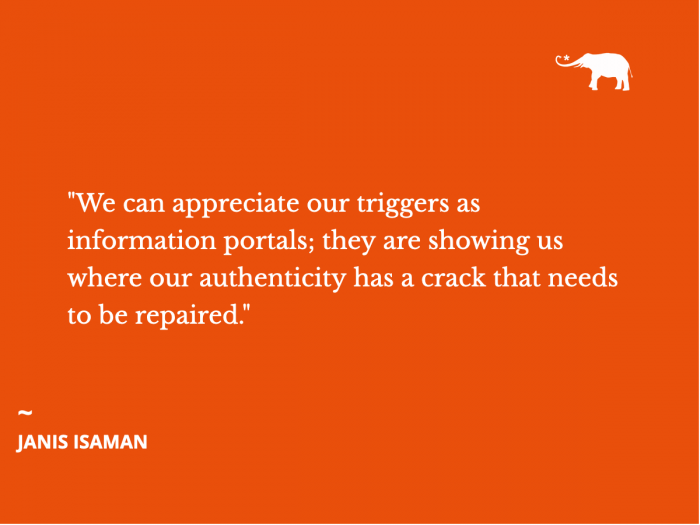View this post on Instagram
*Warning: well-deserved cursing ahead!
I was 16 when I learned it was dangerous to be myself.
Imagine something like this:
You’re making eye contact with an obviously frustrated school administrator. Dropped at the end of a paragraph of his words, without changing volume or tone, it comes: “you are a manipulative bitch.”
At the bottom of the canyon in our heart lies a childhood where we chose acceptance over authenticity.
As children, we were taught to offer measured opinions, please the teacher, follow the rules, and keep ourselves controlled and orderly as though smiling for an invisible camera.
We hide who we are to earn approval, repressing and suppressing who we are. We poke holes in ourselves by creating coping strategies needed to generate both love and approval, but unaware that these childhood holes will cause pain and confusion as adults when we try to fill them.
When we grow up unable to express our authentic selves, we are left with a deep sense of emptiness in our bodies and an unknowingness about how to be authentic in who we are.
My youth was one of external happiness: my family of five vacationed to Disneyland and the Grand Canyon, filling photo albums with images of abundant Christmases and moments together.
It was also one of my personality, already larger than my body could contain, seeping out, to meet negative consequences. Expressing my opinion was “being sassy,” and should I dare to challenge the authority of an adult, I was told to “cooperate” and not “talk back.”
The message: “smile for the camera, honey, and please don’t make a scene.”
Sometimes my voice rose, despite my best intentions to the contrary.
When my high school administrator removed me from a mandatory course at midterm in order to rebalance an unruly class spiralling out of the teacher’s control, I was furious. I was a straight-A student in the running for Valedictorian, and decidedly not the problem. I would need to repeat the course to finish high school, a waste of my time, which frustrated me and felt unfair.
I asked for a meeting to advocate for myself, and when he did nothing, I requested time with his colleague. For my boldness in requesting the second person’s ear, I was a “bitch.”
Trained to respect authority and listen to my elders at all costs, I was sure that it was my fault: my feelings, the cause—my voice, the weapon.
The voices said, “Bitch.” My ears heard, “We don’t want to hear you speak. Your opinions are not welcome to be expressed. You are wrong, now be quiet,” and I dutifully complied.
Afraid of reproach from my parents, nervous that my voice or daring in speaking up made me a “bitch”—fearful that my perspective was flawed, and scared that others might be right about the kind of person I was—I chose acceptance over authenticity, and stuffed everything into an invisible pit. A hole was born.
Our authenticity: shushed, hushed, repressed, and suppressed.
It is no wonder that years later, as adults, we seek not to be authentic but rely instead on maladaptive coping strategies. We were taught to do anything we needed to keep ourselves hidden.
Coping strategies that once earned us love and approval, or at least helped us avoid getting scorned, block us as adults from accessing the authenticity and connection to who we are at essence.
We use accomplishments and belongings to try to cover up our holes. Hoping to find just the right thing—a job, vehicle, house, outfit, companion, or degree—we are sure that the seductive messages of marketing will earn us the acceptance we crave, lest we need to show our true selves.
We blame others for our pains and accuse them of “triggering” us.
We become either avoidant or anxious in relationships.
We drink. We smoke. We eat too much. We exercise too little.
We overwork. We underwork.
And we have no idea that any of these are just coping strategies—things we need to do to spare our inner child from the pain of speaking and being told instead to “shush”—an emotional patch to fill the hole left by the pain of exposing who we really were as children.
How do you find your authentic self when you were never allowed to be who you are?
I eventually found myself in my living room, my eyes meeting the frost of the influence of February on the window. I couldn’t see all the way through the glass to meet the outside with my gaze.
Inside my chest: a similar filmy gauze separating me from my internal sense of who I am. I tried to find the experience of my heart. My anatomy, I could locate. My emotions…I could not. Instead, there was a void.
Feeling into myself felt like falling into a bottomless abyss—the sensation, physically painful, yet with no physical source. I could feel my holes.
Amongst the possessions I accrued on my quest to satisfy my longings: self-help literature. It suggested that the key to a fully self-expressed life was being “authentic.” Yet my books assumed that I could locate my feelings. But I felt nothing. I had listened to the instructions of my childhood well.
Unpeeling my authenticity and learning how to not only find but express my feelings was terrifying, long, and arduous.
We can start with the physical.
I started with my body, laying for hours in yin yoga poses to marinate in the physical sensations of my body.
I bumbled and fumbled and practiced saying my words in an effort to find my voice.
We can accept that our words might come out in the wrong order. At the wrong time. In the wrong way.
I changed friends and confidants.
We can choose safe people who can meet us with compassion. We no longer have to rely on our parents or the teachers of our youth.
I started seeing my reactions as triggers—tender points of entry.
We can recognize that triggers are not about what happened but instead about the emotional maladaptations we needed to develop as children.
I stopped relying on my coping mechanisms.
We can recognize and name our coping mechanisms and practice using discernment to determine what is enjoyable versus a cover-up.
I started naming my feelings, bumbling at first, and improving with practice.
We can explore and name the feelings in our body, sit in those sensations and let them pass, and speak our present moment truth, the residence of our authenticity.
We are no longer the voices we were forced into having as children. We no longer have our teachers or our parents asking us to behave and transform our essence into one of their likings.
We can speak our truths and stand in our feelings without fear of reproach or consequence.
We can choose authenticity over acceptance.
It’s fucking hard work, Bitch.
 Share on bsky
Share on bsky






Read 60 comments and reply